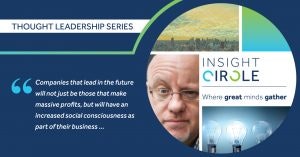
In Part II of our conversation with Brett King, we go into further detail about what it will take to solve long-term global problems such as climate change. We also discuss how capitalism will need to change in the next decade, and his thoughts on the recent surge in populist movements such as the election of Donald Trump, Jair Bolsonaro, Brexit, etc. If you missed Part I of our interview, please find it here.
Global Social Awareness
Regarding the question of overcoming ‘Tragedy of the Commons’ situations such as climate change (see Part 1), Brett said: “This question gets to the heart of what I'm trying to write about regarding The Rise of Techno-Socialism. The subtext is: ‘How AI, Inequality and Climate will Usher in a New World.’ I talk about these as the major drivers behind the changes we will experience in society. Regarding social consciousness and overcoming the Tragedy of the Commons, we can already see it happening where social media is being mobilized to create tribes that want change. Once we have enough people who realize that protests are a start but are less effective than actual policy change, we'll see mobilization of large groups to change policy. I think the Gen Z's and the Gen Y's have grown up in an interconnected world where they can have friends around the planet and where they can purchase something in China and see it delivered to San Francisco two days later. They're more used to the concept of a connected world in terms of social consciousness. The idea that one nation should have superiority over another nation, or that the people of Bangladesh are at fault if they're getting inundated with terrible sea level rise, will give way to a view that the world collectively created these problems and we need a collective global approach to fix them.”
Brett continued: “I think the pressure to fix these problems through enhanced social awareness is powered by internet connectivity. We already see the start of this global social awareness and social movement with what you saw with the protests against the Iraq War. Ultimately, though, it will require a change in governance and economics. I think when we look back at the decade of the 2020s, we will recognize that we saw the limitations of capitalism as a pure system and that we needed something in addition to it. Capitalism in itself has no incentive mechanisms for fixing these large-scale problems unless they provide profit for corporations. When you have something like the impact of climate change, there are certain elements that the market will reward like renewable energy because it's a fraction of the cost of fossil fuel. But capitalism is not incentivized to fix things like climate change nor is it incentivized to make everyone healthier and live longer in the same way as other social constructs. I think there's definitely going to be a drive towards a basic layer of social costs that we accept as part of modern society, and we have to just figure out how to pay for it, whether it’s a tax on robots or a change in the way we think about taxation or maybe things like a universal basic income and asset structures will emerge as well. I definitely think social consciousness on the planet is going to change the way we think about politics and economics.”
Populism: Last Gasp of a Dying System
With the recent populist elections in the US, UK, Brazil etc., seeming to be the opposite of the vision Brett laid out above, we asked his perspective on this trend: “It's the last gasp of a dying system looking for a solution to emerging problems. Ultimately, if you look at what has driven the populist movements like Trump, Brexit and so forth, it's actually not about globalism versus nationalism. It’s about economic uncertainty. People are concerned about cultural change and immigrants taking their jobs and the easy answer from a political perspective is to find a boogeyman that people can be afraid of, whether its immigrants crossing the southern border or immigrants coming from Europe in the case of Britain or the rise of China and so on. The reality is, people are going to learn fairly quickly that Brexit is not going to improve the economic conditions for the average British citizen, and they're going to learn that despite President Trump's success at reducing immigration, the US economy is not well placed to defend itself because there hasn’t been enough investment in technology and STEM education at a national level. People will start to realize that these populist movements didn't work and there will be even greater economic uncertainty as Artificial Intelligence displaces workers and as climate change starts to impact further.”
Income Inequality
Brett continued: “If we are looking for solutions to these basic problems, we will see that part of what's happened is the wealth gap is widening, we have the worst inequality we've seen in 50 years in the United States and Britain. Look at the cost of purchasing a home in the United States. If you were a returning serviceman post World War Two, it took about three times your annual income to buy a family home. In San Francisco today, it's upwards of 18 times the average annual income. In Hong Kong, it's 26 times the average annual income just to buy a one-bedroom apartment! If you are wondering about the protests in Hong Kong, sure there are definitely issues over China coming in and increasingly attacking the rights of the people of Hong Kong, but there's also very real economic uncertainty for the young people. Ultimately, I think the younger people will say, as we've seen with support for Bernie Sanders: ‘Look, capitalism hasn't fixed this problem, it's no good just to say that business is going to fix it. You can’t just say work harder because the jobs aren't available, the robots are taking the jobs and this trend won’t end by raising a wall on the border. Ultimately, it's going to require a change in policy, we're going to be more socially conscious and I think we will be able to use technology to deliver Neo-Socialism at a fraction of the cost of what we could have imagined in the 20th century. The biggest argument against Socialism is: Who is going to pay for it? But we will realize if we don't have an element of universal care for citizens there will be revolution, and also the cost of providing this universal care is now, through technology, getting to the point where it's more affordable to provide it than deny it. I think this will produce a significant shift in political thinking.”
Reality Catches Up with Fake News
Brett also described how the sheer force of reality will increasingly undercut the systemic ‘Fake News’ currently causing confusion in many areas: “A good example is what's happening in Australia right now. You've got the Australian bush fires that have had an incredible impact. Through investigative journalism from various bodies like SBS news in Australia and Greenpeace and others it’s been shown that the right-wing politicians are deeply connected with the coal companies and with Murdoch’s News Corp. You have a fairly systemic attack on the messaging and architecture of the Australian economy to move away from responsiveness to climate change as a policy because of the implications around renewable energy, carbon neutral governance and things like that, which would just be a negative outcome for the coal companies, frankly. Now all this is being exposed, and you have a fairly rapid shift with this level of disaster around the bush fires where people are saying: ‘Hang on a second, you've been telling us there's nothing to worry about, that climate change is fake news. Now we've had the most disastrous fire season in Australian history, and we've seen these seasons getting worse and worse. Now you're telling us that it's likely to continue?!’ There's a real disconnect, at a certain point this sort of fake news cycle won't work because it's going to be so apparent to everybody. You now see politicians in Australia like Scott Morrison, the Prime Minister, held to account in a way that the right-wing government hasn't been in a decade, despite the fact that their communication strategy hasn't really changed. I think we will start to see the real effects of inequality like 30% youth unemployment because of technology displacement, and massive climate issues from rising heat such as the increase of cardiovascular disease in the elderly because of heat stress and sea level rise displacing people in Florida. When we see all these things continue, it won't be enough to blame someone else. It won't be enough to call it fake news. It gets to the point where it's indefensible, and I think that's part of the social awareness I see happening.”
In the third part of our interview with Brett King, to be posted here on April 30, we discuss his views on “winners and losers” at the national and industry levels during the coming transformative decade of the 2020s.
Step into the future of business messaging.
SMS and two-way channels, automation, call center integration, payments - do it all with Clickatell's Chat Commerce platform.








